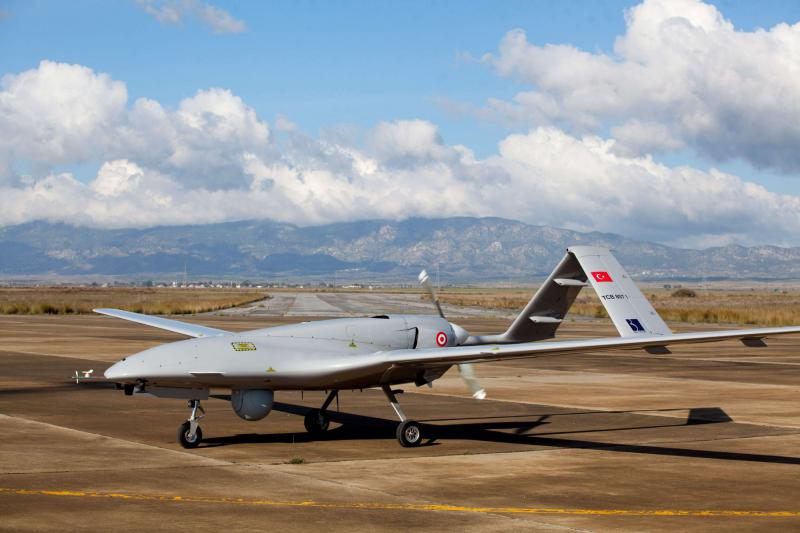The deployment of Turkish drones to northern Cyprus has angered Egypt, which considers the move “a provocation” that will raise the level of tensions in the eastern Mediterranean region. But Egyptian analysts rule out any Egyptian reactions that could boost tensions with Ankara at the present time.
The leader of the breakaway Turkish Cypriots, Ersin Tatar, boasted on Turkish television earlier this month that the Bayraktar TB2 drones at the air base in Gecitkale could be scrambled much faster than from bases on mainland Turkey to “inspect the region” up to the coast of Egypt.
Turkish-Egyptian relations are at standstill despite talks held to normalise their ties.
The two countries have been at odds since the overthrow of the Turkish-backed president Mohamed Morsi, which was followed by a large number of Muslim Brotherhood leaders seeking a safe haven in Turkey.
The Cypriot government views the drone deployment as a means for Turkey to pursue its “expansionist agenda”, using military assets to extend its reach and buttress its control of a region that potentially holds significant natural gas reserves.
Turkey has stationed heavy weapons and more than 35,000 troops in northern Cyprus since the island was split along ethnic lines in 1974, when Turkish forces invaded in response to a coup by supporters of union (enosis) with Greece. The siting of the drones provides Turkey with a wider strike capability that has upped regional unease.
An Egyptian official described the deployment as part of “Ankara’s provocative measures” that requires a “firm reaction” from the international community, especially the United States and the European Union, of which Cyprus is a member.
“The base, along with other measures in Cyprus, Libya and the Mediterranean, would only further destabilise the region. It is alarming,” an Egyptian diplomat told the Associated Press on condition of anonymity.
“The latest (the base) solidifies the notion that Turkey will not be deterred through statements, but it needs actions from relevant countries,” he said.
Although the Turkish moves worry Egypt, analysts rule out any Egyptian escalation towards Turkey in the near future, given that the relations between the two parties are currently frozen and there is an agreement to avoid flare-ups until a settlement of controversial issues is reached.
But analysts see Egypt’s expressions of alarm as intended to carry a message to the international community that any future attempts to accommodate Turkey will only encourage it to engage in more provocative actions, based on Ankara’s assessment that the US and Europe are currently too preoccupied with developments in Afghanistan and Iran to pay attention to what Turkey is doing.
One analyst believes that “Ankara’s move in northern Cyprus aims to ease the pressure on Turkey for the departure of its forces and mercenaries from Libya, where the Turks want to turn their presence into an irreversible fait accompli and part of a wider strategy of widening their footprint in the eastern Mediterranean.”

The international community, regional powers and some Libyan parties have called on Turkey to withdraw its forces and surrogates from Libya but Ankara has rejected all appeals.
Turkish moves are also seen as testing Cairo’s relationship with its Cypriot and Greek allies, which will bring the Mediterranean partnership between the three countries back into the spotlight. It seems likely that Egypt will try to throw the ball into the Europeans’ court while it stands with Greece and Cyprus against Turkey on the issue of gas exploration in the eastern Mediterranean.
In January 2019, the East Mediterranean Gas Forum was created, with headquarters in Cairo. The forum aims to establish a regional gas market, improve trade relations and secure supply and demand among member states.
The agreement to create the forum was reached during a tripartite summit which brought together Cypriot president Nicos Anastasiades, Egyptian president Abdel Fattah El-Sisi and Greek prime minister Kyriakos Mitsotakis.
The head of the International Studies Unit at the Al-Ahram Centre for Political and Strategic Studies, Ahmed Kandil, said Turkey is trying to entrench its presence in the eastern Mediterranean and indicated that the deployment of the drones reflects the Turkish President Recep Tayyip Erdogan’s intent to end the period of calm that has prevailed in the region over the past few months.
He further told The Arab Weekly that “the escalation may be linked to direct problems between Greece and Turkey and to Ankara’s endeavour to show that it will not reverse its position regarding its armed presence in Libya. It may be also an indirect reaction to stalled talks between Turkey and Egypt.”
He explained that the recent Turkish moves “do not help Egypt’s attempts to ensure stability in the eastern Mediterranean, in addition to the fact that Cairo maintains strategic relations with both Greece and Cyprus and this may ignite tensions between the three countries on the one hand and Turkey on the other.”
He pointed out that new tensions in the region will have direct repercussions on East Med exploration for natural resources, since the latest Turkish move is likely to drive away investors and intensify military activities in Egypt’s neighbourhood. Such scenarios are not in Cairo’s interest, he said.
At least two Bayraktar TB2 drones are currently stationed at Gecitkale. With an operating range of 200 kilometres, endurance of 27 hours and a flight ceiling of 6,100 metres, the drones can can carry weapons and surveillance equipment capable of delivering real-time images to Turkish naval vessels.
Turkey is said to be upgrading the Bayraktar’s systems to be satellite-guided to extend their range further. The air base is said to be receiving its own upgrade for a planned deployment of additional drones, surveillance aircraft, training planes and advanced fighter jets.
Source: Arab Weekly
***Show us some LOVE by sharing it!***



